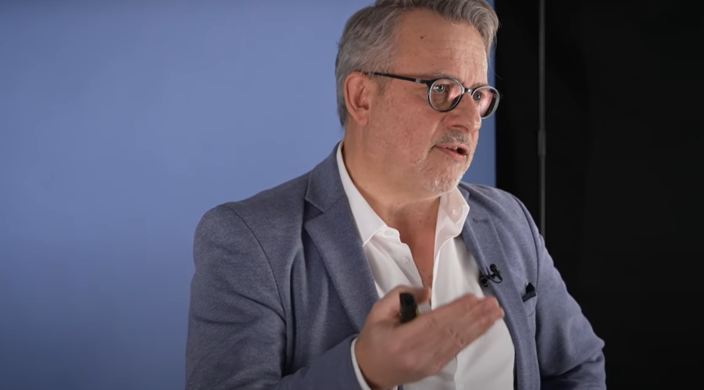In the past, financial aid used to mainly flow through the government, resulting in an unequal distribution of resources and corruption. The alternative, financialized approach to development financing emphasizes the utilization of private investment vehicles. This implies the flow of money from both local and international investment firms and individuals directly to enterprises within developing nations. This enables the transfer of knowledge and capacity building in receiving enterprises and their sustainable access to financial resources.
Mehrpouya highlighted the need to debate the significant potentials but also risks and challenges associated with the rapid rise of diverse forms of private financing models in the world of development. All the panelists agreed that there is untapped potential in this emerging sector.
At present, the primary source of financing for development comes from Private Equity, followed by Impact Investments, which are growing at a rate of $12 billion dollars per year (currently a $50 billion dollar sector). Private Equity firms focus on the financial return, while Impact Investing seeks to target specific social and environmental results in addition to financial profit. Erick Rajaonary, CEO of Guanomad, was the only panelist from the investee side of the equation, working in sustainable agriculture to create organic fertilizers from bat droppings in Madagascar. Founded in 2006, Guanomad now exports its six product lines all over the globe, with a third of exports going to the United States.
Today, 40% of the firm is owned by a South African Private Equity firm, but Rajaonary reiterated the importance of development and investment driven by local resources and capacities. Through the infusion of outside investment and technical assistance, Guanomad has become a viable investment opportunity for its capital providers, while at the same time driving social, economic, and environmental change in Madagascar. The enterprise has remained focused on continuously developing its product lines and its international markets while also addressing the larger concerns of Malagasy society such as food security, organic farming, rural development and environmental protection. Rajaonary also plays an active role in community development through education, professional training, healthcare and social empowerment of people.
On the other end of the spectrum, Jean Michel Severino’s’s Investisseurs & Partenaires (I&P) creates opportunities precisely for enterprises like Guanomad. The impact investment firm, dedicated to development in Sub-Saharan Africa, works in 15 African nations, and has invested in about 60 small and medium enterprises. One particularly successful investment was a cement tile factory owned by a female entrepreneur in Mali. I&P initially invested $50,000 into the firm, and following six years of guidance, the firm had a 30% turnover and 100 employees. I&P sold the company for $150,000, netting an impressive $100,000 profit on the initial investment.
The fact that the company was owned by a woman in a mainly Muslim nation makes this even more impressive. It is creating these types of opportunities that will drive change across the developing world. As asserted by Jean Michel, it is critical to move beyond traditional investment models because there are viable ways through which corporations can use money to serve development and make soft profits at the same time.
The aforementioned examples are encouraging for development financing, but social impact investments do not always generate adequate returns to convince traditional investors such as private equity firms. In these cases, crowd-investing firms such as the Lelapa Fund, co-founded by panelist Elizabeth Howard, can play an important role. The Lelapa Fund connects entrepreneurs in Kenya to short term and long term investors across the globe. Its target investors are venture capitalists and individuals looking to invest in development.
This direct investment model puts the investor's money straight into the hands of Kenyan startups. It might seem risky but it is the most effective method, reducing cost of capital for entrepreneurs. Lelapa Fund screened 550 Kenyan startups in the past year, basing its decisions on both positive and negative social impact. It connected a similar amount of investors to opportunities. However, because Kenya lacks formal government infrastructure to support this type of investment and entrepreneurship, Lelapa Fund has been closely working with Kenyan Financial Markets Regulators since 2014. Jointly, they are implementing a system which allows wealthier Kenyans to invest into this space.
As exemplified by the Lelapa Fund, the role of the public sector and regulators cannot be underestimated in supporting private investment in development. The expansion of a vibrant private sector is in the interest of the central government, given the economic benefits for the nation as a whole. The success of a private venture often spills over into the well-being of a nation. However, as Jean Michel Severino underlined, the problem is that, “if you study poor nations, they have too few corporations to achieve a significant economic impact, and the few corporations that do exist are often poor and not very profitable.” Thus, although corporations are beneficial for national development, poor nations do not have the ability to support such structures. According to Lelapa Fund co-founder Elizabeth Howard, part of the solution to this lies in the creation of “a whole ecosystem…to be built up for people to access these systems.”
André Laude, former Chief Investment Officer of the International Finance Corporation (IFC), tapped into his experience of working for a World Bank member organization to offer significant insight into the public sector perspective. At the IFC, Laude operated with the primary goal of creating sustainable long-term jobs that produce beneficial results for the community at large. Laude stated that development financing institutions and banks must continue to demonstrate that finance can serve public good and still produce profit.
The key seems to be to incentivize private investors to make the leap and invest in market opportunities in developing nations. Once this is done, developing nations will find more support for small scale local projects not often supported by central governments, and large scale investors are likely to become more involved. A key in bringing about this transformation will be mobilizing new forms of financing to drive alternative responsible and sustainable investment models.
Finance to serve development is a growing industry, offering plenty of opportunities both for traditional and impact investors and for communities and societies on the receiving end. The manner in which finance is utilized often attracts debate, but one thing remains clear: Finance, if mobilized responsibly, can help change the world for the better. The results-driven nature of financial markets, if combined with attentiveness to social impact, has immense potential to deliver tangible and effective social outcomes.. So are you ready to be a part of this change?
Written by Daniel Park & Sukanya Narain, HEC Paris students.








